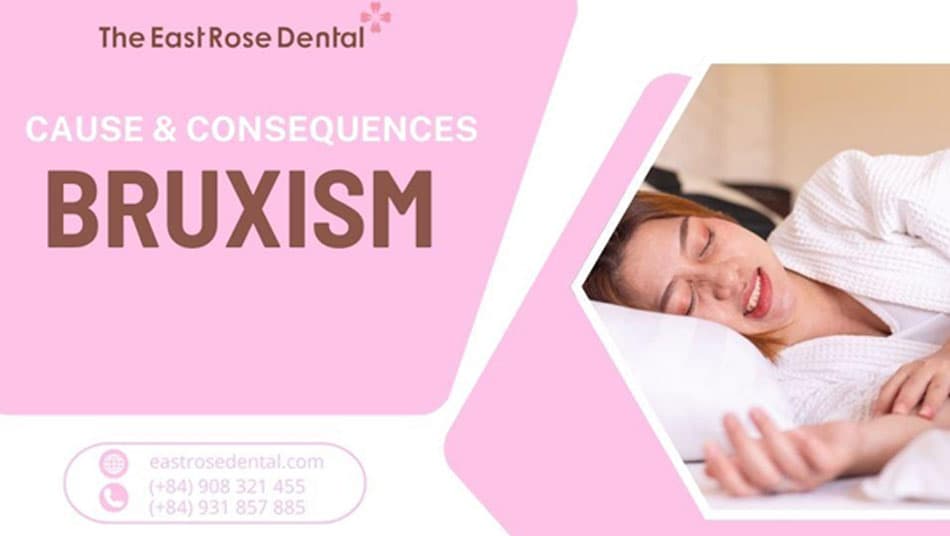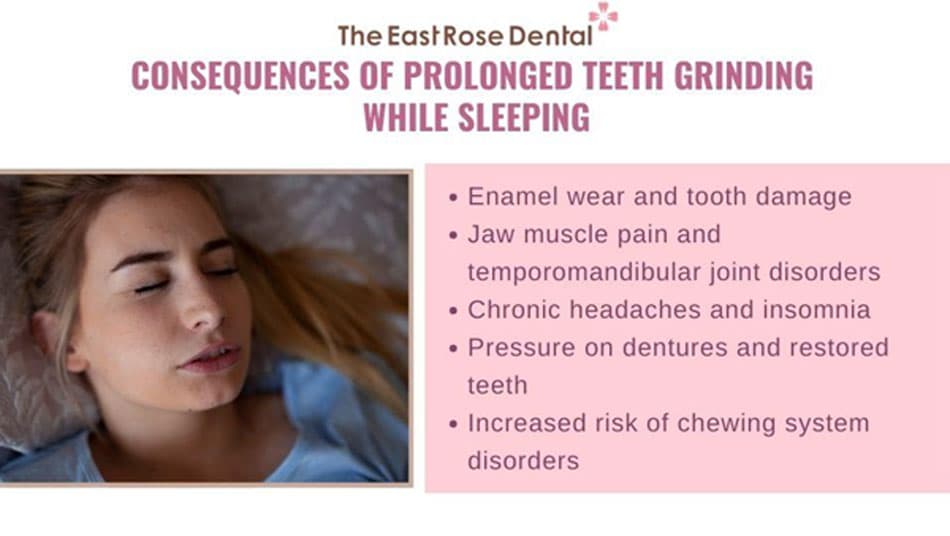Causes and Serious Consequences of Prolonged Bruxism
Teeth grinding during sleep, also known as bruxism, is a common issue that many people are unaware of. This action can cause serious damage to oral health, leading to headaches, temporomandibular joint disorders, and even affecting sleep quality. If left untreated, the consequences can become severe. Let’s explore this in detail with The East Rose Dental Clinic in this article.

What is prolonged teeth grinding during sleep?
Teeth grinding during sleep, also known as bruxism, is an involuntary action of grinding or clenching the teeth, often occurring during sleep. People of all ages can suffer from this common disorder, which often goes unnoticed due to the individual's unawareness of the action. Although the exact cause remains unknown, stress, bite disorders, allergies, or improper sleeping posture are typically associated with it.
Teeth grinding can either produce an annoying squeaking sound or occur silently without the patient realizing it. Negative effects include damage to the bite, jaw muscle disorders, and temporomandibular joint issues, severely affecting chewing function and daily activities. Therefore, it is important to assess the severity and treat the condition promptly to prevent long-term damage.
Exploring the causes of teeth grinding during sleep
Many people experiencing teeth grinding are often unaware or not overly concerned about the causes. However, understanding the underlying reasons can help you easily improve and change this harmful habit.
Stress and anxiety.

Mental stress and anxiety are the leading causes of teeth grinding during sleep. When the body is under pressure from work, family, or daily life concerns, the jaw muscles tend to tighten and grind the teeth unconsciously. This condition not only occurs during the day but can also continue throughout the night, leading to jaw fatigue and headaches.
Malocclusion
Malocclusion, or misalignment of the bite, is another common cause of teeth grinding during sleep. When the upper and lower teeth do not align properly, the jaw muscles have to overwork to maintain balance, leading to uncontrolled teeth grinding. This not only causes tooth wear but also affects chewing function and can result in jaw and facial pain. Correcting the bite through professional dental care is necessary to address this issue.
Frequent Consumption of Stimulants

Using stimulants such as caffeine, nicotine, and alcohol before bedtime can contribute to teeth grinding during sleep. These substances increase nerve activity and stimulate the body, making it difficult to fully relax before sleep. As a result, the jaw tends to tighten and grind teeth more throughout the night. Reduced consumption of these stimulants, especially in the evening, can help minimize teeth grinding.
Sleep Disorders
Teeth grinding is closely associated with sleep disorders such as sleep apnea and insomnia. When sleep is not deep and continuous, the body tries to adjust by clenching the jaw, leading to teeth grinding. Sleep apnea also causes irregularities in breathing patterns, overstimulating the jaw muscles. Therefore, having a relaxing night’s sleep can help reduce teeth grinding during sleep.
Genetic Factors

Genetic factors play an important role in causing teeth grinding during sleep. Studies have shown that if a family member suffers from bruxism, there is a high likelihood that future generations will experience the same condition. The inheritance of biological traits related to jaw structure, bite alignment, or nerve activity, all of which affect jaw muscle control during sleep, explains this. Additionally, inherited psychological traits, such as tendencies toward anxiety or stress, can also contribute to an increased risk of grinding teeth.
Job characteristics and tooth grinding
High-pressure jobs or those requiring constant focus can lead many people to unconsciously grind their teeth both day and night. Professions that involve urgent decisions, mentally demanding tasks, or heavy physical labor often create significant psychological stress. This pressure causes the body to react by tightening the jaw and grinding the teeth as a stress relief mechanism. If this habit continues or there is no psychological outlet, it will eventually affect overall oral health.
Physical Conditions
Teeth grinding during sleep can stem from underlying physical health issues. Bruxism is associated with disorders such as sleep apnea, gastroesophageal reflux disease (GERD), or neurological conditions. Sleep apnea causes short periods of oxygen deprivation, triggering the jaw muscles to work harder to keep the airway open, leading to teeth grinding. GERD can also cause the body to reflexively clench the jaw to reduce throat discomfort.
Additionally, neurological conditions like Parkinson’s disease or muscle spasms can affect jaw muscle control, resulting in involuntary teeth grinding. Treating these underlying conditions is crucial in managing and preventing prolonged teeth grinding.
Consequences of Prolonged Teeth Grinding During Sleep

Teeth grinding during sleep is not just an unconscious habit; it also poses several risks to both oral health and overall well-being, such as:
- Tooth Enamel Wear and Damage: Continuous grinding exerts significant pressure on the tooth surface, leading to enamel wear and even causing cracks or fractures in the teeth. This condition not only affects aesthetics but also increases the risk of cavities and tooth sensitivity due to the loss of the protective enamel layer.
- Temporomandibular Joint Disorder (TMJ) and Jaw Muscle Pain: Overworked jaw muscles cause persistent pain and soreness. Additionally, prolonged pressure can result in TMJ disorders, making it difficult to chew, speak, or move the jaw properly.
- Grinding often causes jaw muscle tension, which can lead to persistent headaches, particularly in the temporal region. Continuous grinding movements disrupt sleep, preventing the body from fully resting and leading to chronic insomnia.
- Pressure on Dentures and Restored Teeth: For individuals with dentures, bridges, or implants, teeth grinding can damage dental restorations, causing them to loosen or break. This results in expensive repairs and time-consuming treatment.
- Increased Risk of Chewing System Dysfunction: The long-term consequence of teeth grinding is the disruption of the chewing system’s function, directly affecting the ability to chew and digest food. This may lead to digestive issues and nutritional problems.
- Direct impact on gums: Prolonged teeth grinding during sleep can affect the gums, leading to inflammation, swelling, bleeding, and even gum recession.
- Negative impact on mental health: Stress and anxiety are the main causes of teeth grinding, and when the condition persists, it can lead to fatigue, stress, and even affect sleep quality and the patient's mood.
People often overlook the common issue of teeth grinding during sleep. While it does not pose an immediate threat to life, prolonged grinding can lead to serious consequences for both oral health and overall well-being. Therefore, early detection and finding suitable treatment solutions are essential to protect health and improve quality of life.
Nội dung của H1
Nội dung của H2
Nội dung của H3
Nội dung của H4
Nội dung của H5
Services
Working Time
- Monday - Friday: 08:00 - 19:00
- Saturday: 08:00 - 18:00
- Sunday closed
Contact Info
- Hotline 1: (+84) 908 321 455
- Hotline 2: (+84) 931 857 885
- Mobile: (+84) 8 3925 8778
- Phone: (+84)2 838 258 778
- info@dentalrose.net
- rosedentalclinicvn@gmail.com
 English
English  Tiếng Việt
Tiếng Việt

